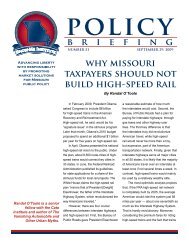MBTA Review - November 1, 2009
MBTA Review - November 1, 2009
MBTA Review - November 1, 2009
Create successful ePaper yourself
Turn your PDF publications into a flip-book with our unique Google optimized e-Paper software.
The Outlook Is Bleak<br />
Our “frank<br />
assessment”<br />
concludes that a<br />
structural operating<br />
deficit has existed<br />
for many years.<br />
The legislation known as “Forward Funding” that was implemented in<br />
July 2000 to make the <strong>MBTA</strong> financially self-sufficient was a great idea.<br />
Unfortunately, the <strong>MBTA</strong> plan developed to implement Forward Funding<br />
was unrealistic and destined to fail. As a result, a structural operating<br />
deficit between expenses and revenue has existed for many years—<br />
predating this administration.<br />
Through depleting cash reserves, restructuring debt and delaying planned<br />
debt payments, the <strong>MBTA</strong> has managed to meet its requirement to balance<br />
its annual budget. Unfortunately, the repeated restructuring of hundreds of<br />
millions of dollars in debt payments achieved the exact opposite intent of<br />
the legislation that sought to transform the <strong>MBTA</strong>, and postponed the day<br />
of reckoning for repaying deferred interest and principal.<br />
As homeowners painfully learned in the sub-prime mortgage debacle, it<br />
is only a matter of time before those delayed payments are due.<br />
That time has arrived.<br />
The <strong>MBTA</strong> must now face larger and growing deficits over the next<br />
few years as a result of these restructurings, added debt and many<br />
unavoidable costs that are now built into the system.<br />
This year the <strong>MBTA</strong>’s FY10 budget faced a deficit of $186M. After <strong>MBTA</strong><br />
management exercised $26M in budget cuts, the remaining shortfall was<br />
resolved when the Legislature authorized the transfer of $160M in new<br />
sales tax revenues to the <strong>MBTA</strong>, on top of the <strong>MBTA</strong>’s existing sales tax<br />
revenue base. Assuming this $160M amount is dedicated each year for<br />
the next four, it represents only a partial solution to emerging deficits.<br />
Based on current revenue and expenditure trends, the <strong>MBTA</strong> will post<br />
cumulative deficits through FY14 as follows:<br />
Projected <strong>MBTA</strong><br />
Cumulative Deficits<br />
FY11-FY14<br />
0<br />
(300)<br />
FY 2011 FY 2012 FY 2013 FY 2014<br />
$70M<br />
$155M<br />
$230M<br />
$329M<br />
$ Millions<br />
(600)<br />
(900)<br />
With $160M in new<br />
sales tax revenue<br />
Without new sales<br />
tax revenue<br />
$475M<br />
$809M<br />
$550M<br />
$1.19B<br />
(1,200)<br />
<strong>MBTA</strong> <strong>Review</strong> | <strong>November</strong> <strong>2009</strong><br />
p. 3






